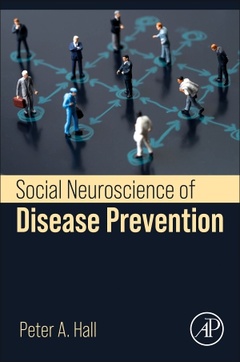Description
Social Neuroscience of Disease Prevention
Author: Hall Peter A.
Language: English
Subject for Social Neuroscience of Disease Prevention:
Keywords
Brain; disease; disease prevention; fMRI; neuroimaging; neuromodulation; population health
410 p. · 15.2x22.8 cm · Paperback
Description
/li>Contents
/li>Biography
/li>Comment
/li>
Many diseases have the potential to affect the brain. This is true of chronic diseases (e.g., diabetes, heart disease), infectious diseases (e.g., COVID-19, HIV), pre-disease states (e.g., hypertension, obesity), and specific traumatic events (e.g., concussion, stroke). On the other hand, neurodegenerative conditions and some psychiatric disorders are largely understood to be diseases of the brain itself. It is therefore quite natural to think about the brain as an outcome variable in relation to physical and psychiatric illness. However, it is also possible to consider the brain as a mechanism by which a disease may impact an entirely different outcome of interest, or even as a predictor of disease onset itself. Importantly, these effects may be revealed only under certain environmental conditions, and so the social context of behavior, illness and health are all important to consider. Social Neuroscience of Disease Prevention examines the role of the human brain in health and disease from the above multi-perspective framework, wherein the brain can be a predictor, mediator or outcome of physical and psychiatric illness. Importantly, the social context is examined carefully as a potential moderator of all of these effects, and the rate at which they occur. This book is written with a narrative style that is intended to prioritize readability, self-reflection and critical thought, more so than a pure computational or technical focus. It is appropriate for scientists and trainees from a wide variety of backgrounds, including the medical sciences, the neurosciences, allied health sciences and public health.
2. Brain Health
3. Neuroscience of Health Communication
4. Neurobiology of Health Behavior Change
5. Exercise Neuroscience
6. Eating and the Human Brain
7. The Brain on Drugs and Drugs on the Brain
8. Stress and Resilience in the Human Brain
9. Developmental Influences on Brain Health
10. Socioeconomic Forces and Brain Development
11. Early Adversity and the Developing Brain
12. Enivornmental Toxins, Public Policy and the BrainStrategy of Preventive Medicine
13. Brain Health
14. Neuroscience of Health Communication
15. Neurobiology of Health Behavior Change
16. Exercise Neuroscience
17. Eating and the Human Brain
18. The Brain on Drugs and Drugs on the Brain
19. Stress and Resilience in the Human Brain
20. Developmental Influences on Brain Health
21. Socioeconomic Forces and Brain Development
22. Early Adversity and the Developing Brain
23. Enivornmental Toxins, Public Policy and the Brain
- Identifies how the brain predicts, mediates and manifests disease in social context
- Links neurobiology to population level social dynamics
- Reviews brain health impacts of early adversity, exercise, stress, nutrition, and more
- Discusses preventive medicine from a translational neuroscience perspective




